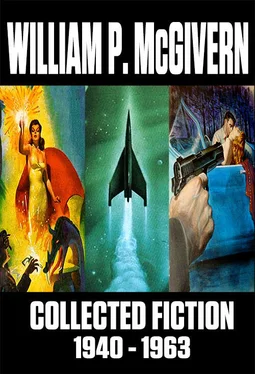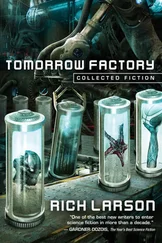Уильям Макгиверн - Collected Fiction - 1940-1963
Здесь есть возможность читать онлайн «Уильям Макгиверн - Collected Fiction - 1940-1963» весь текст электронной книги совершенно бесплатно (целиком полную версию без сокращений). В некоторых случаях можно слушать аудио, скачать через торрент в формате fb2 и присутствует краткое содержание. Год выпуска: 2014, Издательство: Jerry eBooks, Жанр: Ужасы и Мистика, Фантастика и фэнтези, Детектив, Прочие приключения, на английском языке. Описание произведения, (предисловие) а так же отзывы посетителей доступны на портале библиотеки ЛибКат.
- Название:Collected Fiction: 1940-1963
- Автор:
- Издательство:Jerry eBooks
- Жанр:
- Год:2014
- ISBN:нет данных
- Рейтинг книги:3 / 5. Голосов: 1
-
Избранное:Добавить в избранное
- Отзывы:
-
Ваша оценка:
- 60
- 1
- 2
- 3
- 4
- 5
Collected Fiction: 1940-1963: краткое содержание, описание и аннотация
Предлагаем к чтению аннотацию, описание, краткое содержание или предисловие (зависит от того, что написал сам автор книги «Collected Fiction: 1940-1963»). Если вы не нашли необходимую информацию о книге — напишите в комментариях, мы постараемся отыскать её.
Collected Fiction: 1940-1963 — читать онлайн бесплатно полную книгу (весь текст) целиком
Ниже представлен текст книги, разбитый по страницам. Система сохранения места последней прочитанной страницы, позволяет с удобством читать онлайн бесплатно книгу «Collected Fiction: 1940-1963», без необходимости каждый раз заново искать на чём Вы остановились. Поставьте закладку, и сможете в любой момент перейти на страницу, на которой закончили чтение.
Интервал:
Закладка:
The little girl sighed softly as she looked out for the last time across the spires of the moored ships. Then she threw another switch and the ship began to move...
Old John and the young man from Inter-PlanetaryService found little Johnny wandering hysterically through the maze of ships an hour or so later. By that time the young man knew what had happened and was very sheepish about it.
“Yes, I’m sure she’s good,” he said, much later to the little boy. This was about the fiftieth time he’d said it. “I found out she was an agent, just like me, but from Venus. I’ll never live this one down if I get to be a thousand. She’s good, all right!”
“Good,” Johnny said, laughing. He stared at the sky, pure adoration in his eyes. “I love you, Lucy,” he shouted. “I did all the time.” And he was thinking about where he had thrown the little red rubber ball, and wondering if he could find it in the morning.
Somehow he was sure he could.
Equation of Doom
First published in the February 1957 issue of Amazing Stories .
They grounded Ramsey’s ship on a hostile planet hoping he would starve to death, so the first thing he did was give most of his money away and lose the rest gambling. Then he picked a fight with the Chief of Police and joined forces with a half-naked dream-chick who was seemingly bent on self-destruction. The stakes were big — a planet or two — but it all added up to an—
“Your name ith Jathon Ramthey?” the Port Security Officer lisped politely.
Jason Ramsey, who wore the uniform of Interstellar Transfer Service and was the only Earthman in the Service here on Irwadi, smiled and said: “Take three guesses. You know darn well I’m Ramsey.” He was a big man even by Earth standards, which meant he towered over the Irwadian’s green, scaly head. He was fair of skin and had hair the color of copper. It was rumored on Irwadi and elsewhere that he couldn’t return to Earth because of some crime he had committed.
“Alwayth the chip on the shoulder,” the Port Security Officer said. “Won’t you Earthmen ever learn?” The splay-tongued reptile-humanoids of Irwadi always spoke Interstellar Coine with a pronounced lisp which Ramsey found annoying, especially since it went so well with the officious and underhanded behavior for which the Irwadians were famous the galaxy over.
“Get to the point,” Ramsey said harshly. “I have a ship to take through hyper-space.”
“No. You have no ship.”
“No? Then what’s this?” His irritation mounting, Ramsey pulled out the Interstellar Transfer Service authorization form and showed it to the Security Officer. “A tip-sheet for the weightless races at Fomalhaut VI?”
The Security Officer said: “Ha, ha, ha.” He could not laugh; he merely uttered the phonetic equivalent of laughter. On harsh Irwadi, laughter would have been a cultural anomaly. “You make joketh. Well, nevertheleth, you have no ship.” He expanded his scaly green barrel chest and declaimed: “At 0400 hours thith morning, the government of Irwadi hath planetarithed the Irwadi Tranthfer Thervith.”
“Planetarized the Transfer Service!” gasped Ramsey in surprise. He knew the Irwadians had been contemplating the move in theory for many years, but he also knew that transferring a starship from normal space through hyper-space back to normal space again was a tremendously difficult and technical task. He doubted if half a dozen Irwadians had mastered it, yet the Irwadi branch of Interstellar Transfer Service was made up of seventy-five hyper-space pilots of divers planetalities.
“Ecthactly,” said the Security Officer, as amused as an Irwadian could be by the amazement in Ramsey’s frank green eyes. “Tho if you will kindly thurrender your permit?”
“Let’s see it in writing, huh?”
The Security Officer complied. Ramsey read the official document, scowled, and handed over his Irwadi pilot license. “What about the Polaris ?” he wanted to know. The Polaris was a Centaurian ship he’d been scheduled to take through hyper-space on the run from Irwadi to Centauri III.
“Temporarily grounded, captain. Or should I thay, ecth-captain?”
“Temporarily my foot,” said Ramsey. “It’ll be months before you Irwadians can get even a fraction of the ships into hyper. You must be out of your minds.”
“Our problem, captain. Not yourth.”
That was true enough. Ramsey shrugged.
“Your problem,” the Security Officer went on blandly, “will be to find a meanth of thelf-thupport until you and all other ecthra-planetarieth can be removed from Irwadi. We owe you ecthra-planetarieth nothing. Ethpect no charity from uth.”
Ramsey shrugged. Like all extra-planetaries on a bleak, friendless world like Irwadi, he’d regularly gambled away and drank away his monthly paycheck in the interstellar settlement which the Irwadians had established in the Old Quarter of Irwadi City. But last month he’d managed to come out even at the gaming tables, so he had a few hundred credits to his name. That would be enough, he told himself, to tide him over until Interstellar Transfer Service came to the rescue of its stranded pilots.
Ramsey went up the gangway and got his gear from the Polaris . When he returned down the gangway, the late afternoon wind was blowing across the spacefield tarmac, a wet, bone-chilling wind which only the reptile-humanoid Irwadians didn’t seem to mind.
Ramsey fastened the toggles of his cold-weather cape, put his head down and hunched his shoulders, and walked into the teeth of the wind. He did not look back at the Polaris , marooned indefinitely on Irwadi despite anything the Centaurian owners or anyone else for that matter could do about it.
The Irwadi Security Officer, whose name was Chind Ramar, walked up the gangway and ordered the ship’s Centaurian first officer to assemble his crew and passengers. Chind Ramar allowed himself the rare luxury of a fleeting smile. He could imagine this scene being duplicated on fifty ships here on his native planet today, fifty outworld ships which had no business at all on Irwadi. Of course, Irwadi was an important planet-of-call in the Galactic Federation because the vital metal titanium was found as abundantly in Irwadian soil as aluminum is found in the soil of an Earth-style planet. Titanium, in alloy with steel and manganese, was the only element which could withstand the tremendous heat generated in the drive-chambers of interstellar ships during transfer. In the future, Chind Ramar told himself with a kind of cold pride, only Irwadian pilots, piloting Irwadian ships through hyper-space, would bring titanium to the waiting galaxy. At Irwadi prices.
With great relish, Chind Ramar announced the facts of planetarization and told the Centaurians and their passengers that they would be stranded for an indefinite period on Irwadi. Amazement, anger, bluster, debate, and finally resignation — the reactions were the expected ones, in the expected order. It was easy, Chind Ramar thought, with all but the interstellar soldiers of fortune like Jason Ramsey. Ramsey, of course, would need watching. As for these others...
One of the others, an Earthgirl whose beauty was entirely missed by Chind Ramar, left the Polaris in a hurry. She either had no luggage or left her luggage aboard. Jason Ramsey, she thought. She had read Chind Ramar’s mind; a feat growing less rare although by no means common yet among the offspring of those who had spent a great deal of time bombarded by cosmic radiation between the stars. She hurried through the chilling wind toward the Old Quarter of Irwadi City. Panic, she thought. You’ve got to avoid panic. If you panic, you’re finished...
“So that’s about the size of it,” Ramsey finished.
Читать дальшеИнтервал:
Закладка:
Похожие книги на «Collected Fiction: 1940-1963»
Представляем Вашему вниманию похожие книги на «Collected Fiction: 1940-1963» списком для выбора. Мы отобрали схожую по названию и смыслу литературу в надежде предоставить читателям больше вариантов отыскать новые, интересные, ещё непрочитанные произведения.
Обсуждение, отзывы о книге «Collected Fiction: 1940-1963» и просто собственные мнения читателей. Оставьте ваши комментарии, напишите, что Вы думаете о произведении, его смысле или главных героях. Укажите что конкретно понравилось, а что нет, и почему Вы так считаете.

![Уильям Макгиверн - Завтра опять неизвестность [английский и русский параллельные тексты]](/books/35168/uilyam-makgivern-zavtra-opyat-neizvestnost-angli-thumb.webp)









